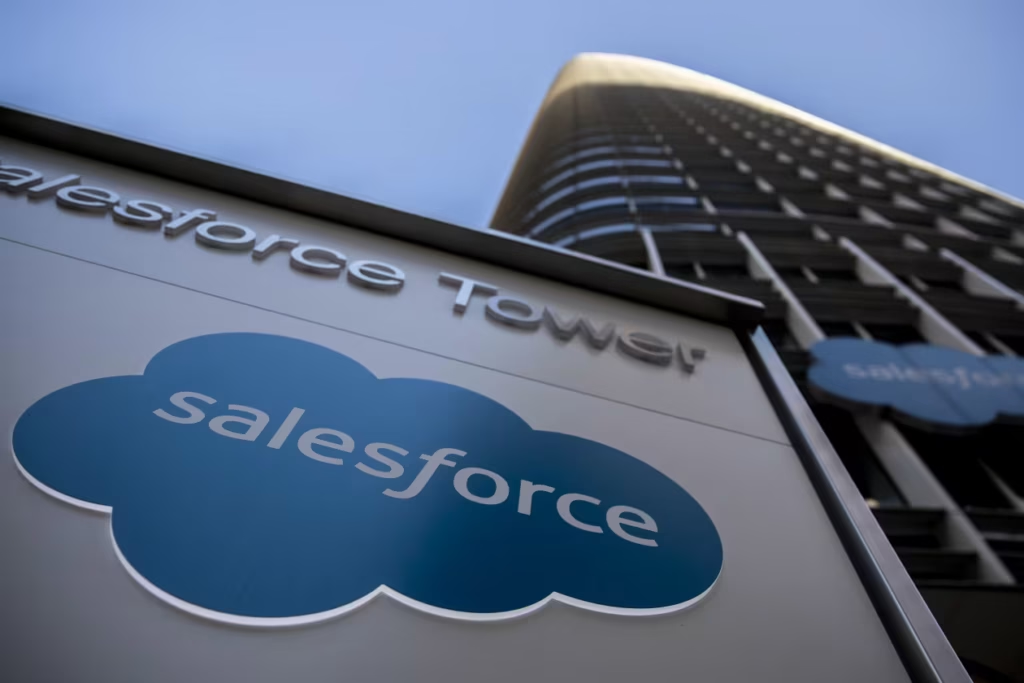Salesforce’s adoption of AI agents is progressing, but questions about its revenue growth still exist.
Salesforce Inc.’s shares did not rise despite its better-than-expected earnings announcement. Shares may really see their biggest drop in almost a year.
Given that investors have been unsure if AI-native apps can take the place of conventional software systems, it is simple to attribute Salesforce’s (CRM) stock performance to AI-related worries.
However, a growing number of analysts are arguing that the “AI eats software” myth is exaggerated, creating unwarranted skepticism toward the software industry in general and Salesforce in particular.
Mark Moerdler, a rare bear on Salesforce’s stock, of Bernstein disagreed with the notion that software-as-a-service business models are being destroyed by AI applications. However, he had other complaints about Salesforce’s functionality.
Moerdler finds Salesforce’s sluggish growth and growing competition from companies like Microsoft Corp. (MSFT), ServiceNow Inc. (NOW), and HubSpot Inc. (HUBS) more worrisome than the AI story. This suggests that the market for customer relationship management software is saturated. Moerdler recommends Microsoft’s Copilot because it has cheaper prices and integrates with Office products.
“Everyone is building some form of a data cloud and competition is going to be strong,” Moerdler stated.
Because of this, Moerdler thinks it will be challenging for Salesforce to increase revenues quickly, particularly in the marketing division, where revenue growth was only 3% in the previous quarter. Since AI is still in its infancy and there is potential for price reductions due to more competition, he also does not anticipate AI to significantly boost the company’s revenue growth.
“We believe that Salesforce can grow subscription revenue in the high single digits, slowing further over time and that the ability to drive margins will become more and more difficult,” he stated. According to Moerdler, Salesforce will need to demonstrate that subscription revenue is reaccelerating into the double-digit range in order for its stock to make a strong recovery, which he doesn’t think is likely to happen. In the most recent quarter, subscription revenue increased by 11%, or 9% in constant currency.
According to Dow Jones Market Data, Salesforce’s stock fell 6.6% on Thursday morning, potentially making it its worst day since May 2024 if the losses continue until the end of the day. Only UnitedHealth Group Inc.’s stock (UNH) has seen a greater fall, with the stock down 28% year to date, making it the second-worst performer in the Dow Jones Industrial Average for the year.
Mark Murphy, an analyst at J.P. Morgan, is more optimistic about Salesforce as a whole, citing the company’s revenue and current remaining performance obligations (cRPO) as reliable markers of the potential for AI development. Murphy contends that although Salesforce is making headway with its AI solutions, these advancements are “falling on deaf ears due to overdone concerns relating to the potential impact of AI on seat-based SaaS models,” which refers to software-as-a-service businesses.
Matt Stucky, chief portfolio manager of equities at Northwestern Mutual, said that another indication that AI concerns are exaggerated is Salesforce’s popularity among small and medium-sized business clients, which management highlighted on the earnings call.
Before the earnings report on Wednesday, Stucky told MarketWatch, “There are a lot of people that have convinced themselves that small and medium-sized business owners are going to basically vibe-code their own CRM systems and not buy software from Salesforce.” This means that they will use AI tools as a less expensive way to mimic Salesforce functions. “I just don’t think that’s a feasible long-term scenario.”
Moerdler at Bernstein kept his underperform rating and reduced his price objective on Salesforce from $255 to $221. Murphy of J.P. Morgan maintained his overweight rating while reducing his price objective from $380 to $365.
Although Murphy is more upbeat about the stock, he did admit that it would be challenging to maintain overall growth in the future if Salesforce’s Sales Cloud division slows down.





